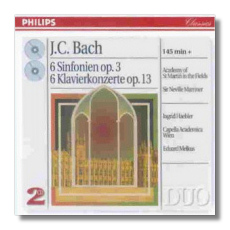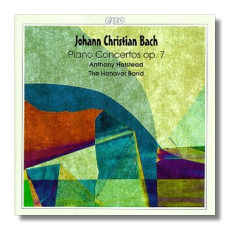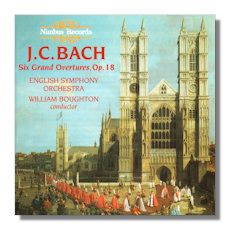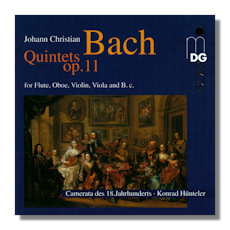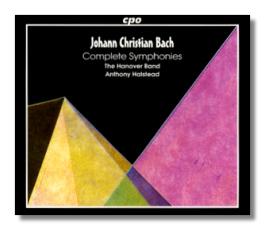
The Internet's Premier Classical Music Source
Related Links
-
Find CDs & Downloads
Amazon - UK - Germany - Canada - France - Japan
ArkivMusic - CD Universe
Find DVDs & Blu-ray
Amazon - UK - Germany - Canada - France - Japan
ArkivMusic-Video Universe
Find Scores & Sheet Music
Sheet Music Plus -
Recommended Links
Site News
Johann Christian Bach
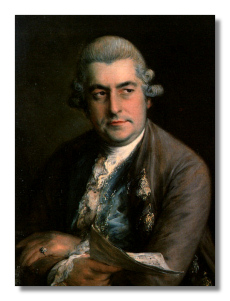
(1735 - 1782)
The 11th son of Johann Sebastian Bach and the youngest to live to maturity, Johann Christian received his early musical training from his father, than whom music has spawned no greater genius. When Christian was fourteen his father died. Thereupon he studied with his brother Carl Philipp Emanuel. Four years later he left for Italy, where he continued his studies and won a patron. Eventually he became organist at the cathedral of Milan and began to compose operas, economically the most rewarding of compositional forms in those days. In 1762 he emigrated to London, his home until his death 20 years later. The "London" Bach achieved immediate renown in England, and within two years was appointed music master to the Queen. Until his health failed, he was the co-organizer (with Carl Abel) of an acclaimed series of London concerts that took place over two decades.
Bach departed from the musical style of his father and older brothers, anticipating and indeed contributing to the development of the so-called "classical" era. His tendencies include a new emphasis on emotional expression, a shift from ecclesiastical to concert-hall forms and genres, and a conscious featuring of virtuoso instrumental registration. His work embodies the "style galant" of the last half of the 18th Century. Besides his many operas and chamber compositions, Bach wrote around 90 symphonies, productivity akin to that of Haydn. Had Johann Christian's father J.S. Bach never existed, Johann Christian's place in musical history would be secure. So profound and excellent were his talents and knowledge, the child prodigy Wolfgang Mozart was brought to him in London in 1764 for instruction. Mozart acknowledged his debt to his mentor by using several of Bach's piano sonatas as the bases for his own early piano concertos. ~ Douglas Purl
Recommended Recordings
Concertos for Harpsichord or Fortepiano
- 6 Concertos, Op. 13 with Sinfonias Op. 3/Philips Duo 456064-2
-
Ingrid Haebler (fortepiano), Eduard Melkus/Capella Academica, Wien
- 6 Concertos, Op. 1/CPO 999299-2
-
Anthony Halstead (harpsichord)/Hanover Band
- 6 Concertos, Op. 7/CPO 999600-2
-
Anthony Halstead (harpsichord)/Hanover Band
- 4 Concertos, Op. 13 #1-3 & in E Flat Major/CPO 999601-2
-
Anthony Halstead (fortepiano)/Hanover Band
- 4 Concertos, Op. 13 #4-5 & Op. 14/CPO 999691-2
-
Anthony Halstead (fortepiano)/Hanover Band
- 3 Concertos in A Major, F minor & G Major Op. 7 #6/Denon 33C37-7672
-
Huguette Dreyfus (harpsichord)/Tokyo Solisten
Overtures
- 6 "Grand" Overtures, Op. 18/CPO 999752-2
-
Anthony Halstead/Hanover Band
- 6 "Grand" Overtures, Op. 18/Nimbus NI5403
-
William Boughton/English Symphony Orchestra
- 6 "Grand" Overtures, Op. 18/Naxos 8.553367
-
Hanspeter Gmür/Failoni Orchestra Budapest
- 6 "Favorite" Overtures/L'Oiseau-Lyre 417148-2
-
Christopher Hogwood/Academy of Ancient Music
Quintets for Flute, Oboe & Strings
- Quintets, Op. 11 #1-6/MD&G Gold 3110613
-
Konrad Hünteler/Camerata of the 18th Century
- Quintets, Op. 11 #1 & 6, Op. 22 #1 and Sextet in C Major/Archiv 423385-2
-
Various Performers/The English Concert
Symphonies
- 6 Symphonies, Op. 3 with Concertos Op. 13/Philips Duo 456064-2
-
Neville Marriner/Academy of St. Martin-In-The-Fields
- Complete Symphonies, Op. 3, 6, 8, 9 & 18/CPO 999896-2
-
Anthony Halstead/Hanover Band














